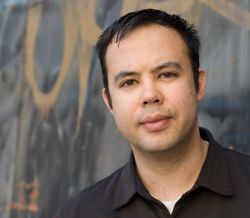
Neil Tangaroa Aitken is the author of The Lost Country of Sight which won the 2007 Philip Levine Prize for Poetry and was published by Anhinga Press in 2008. His work has been nominated for the Pushcart Prize three times and has appeared in Crab Orchard Review, The Drunken Boat, Ninth Letter, Poetry Southeast, Sou’wester, and elsewhere.
Born in Vancouver, British Columbia, Neil grew up in Saudi Arabia, Taiwan, and the western parts of the United States and Canada. He holds a B.S. in Computer Science from Brigham Young University, an M.F.A. in Creative Writing from the University of California – Riverside, and is currently working on a Ph.D. in Literature & Creative Writing at the University of Southern California.
In our Process Profiles series, young contemporary Asian American poets discuss their craft, focusing on their process for a single poem from inception to publication. Here, Neil discusses “I Dream My Father on the Shore,” the final poem in his collection The Lost Country of Sight.
* * *
It was the summer of 2006 and I was attending my second Kundiman retreat at the University of Virginia. We’d been challenged to write a ghazal and when I sat down to work on the poem, I found myself linking the form’s tradition of exploring the ties between beauty and loss with my own memories of my father’s loss of his father. Although I’d written about that experience many years before, I felt that a different poem might reside in the space created by time and distance, and the way that dreams and memories alter our understanding of the past. I set out to craft something that would carry a certain dreamlike lushness, while reflecting the constant turn and return of the form.
The poem went through several drafts and gradually I realized that perhaps the ghazal was not the actual form it needed to take. I ended up trimming out most of the repetition, but tried to keep a sense of the original form present through sound and rhythm – like a ghost or an afterimage of the ghazal. Switching to free-verse opened up more possibilities, allowing the line-breaks to do more work and permitting me to extend images, phrases, and conceits over larger spaces in the poem.
As I worked on the poem, I found myself reflecting on my own relationship with my father and how he had once told me that he would not live a long life; that he would likely die young from one of the many health conditions he endured. His sense of mortality and the way he had offered the news to me before I first left for college all those years ago seemed in some way to echo a line from Wendell Berry’s “The Country of Marriage” and so I eventually included that line as the poem’s epigraph. By the time the poem was published by Sou’wester in late 2007, my father had passed away from an aggressive form of ALS and the closing lines of the poem suddenly became much more than dream or metaphor. When I assembled the version of the manuscript that became The Lost Country of Sight, I knew that this would be the poem to complete the book, and that those last images would be the ones I wanted to linger on when the final page was turned.
Below is the final version of “I Dream My Father on the Shore,” as it appears in Neil’s collection:
I Dream My Father on the Shore
What I am learning to give you is my death.
~ Wendell BerryOutside, beneath the light of late October’s candled sky
the weave of ash and maple burns. We stand silent on the graveled shore.
My father lifts his father’s ashes from its urn, a strangely heavy thing,
he seems to say, his arms swaying, then casting out into the long dark
as if to throw a line, while we wait for some sound, a wave,
whatever marks the distance between a father and a son.And when night comes, it comes without a tread, without a word.
The stars flickering in their endless retreat, more distant and sure
than before, do nothing while the shadows continue to fill the trees
with their cast-off clothes. The harvest is long past, the apples
have fallen to the orchard floors. Even my father turning to go
is almost lost to the reeds already in his path, his figure no more
than a pattern of light – a memory of a road that winds
through the darkness to our waiting ride home.